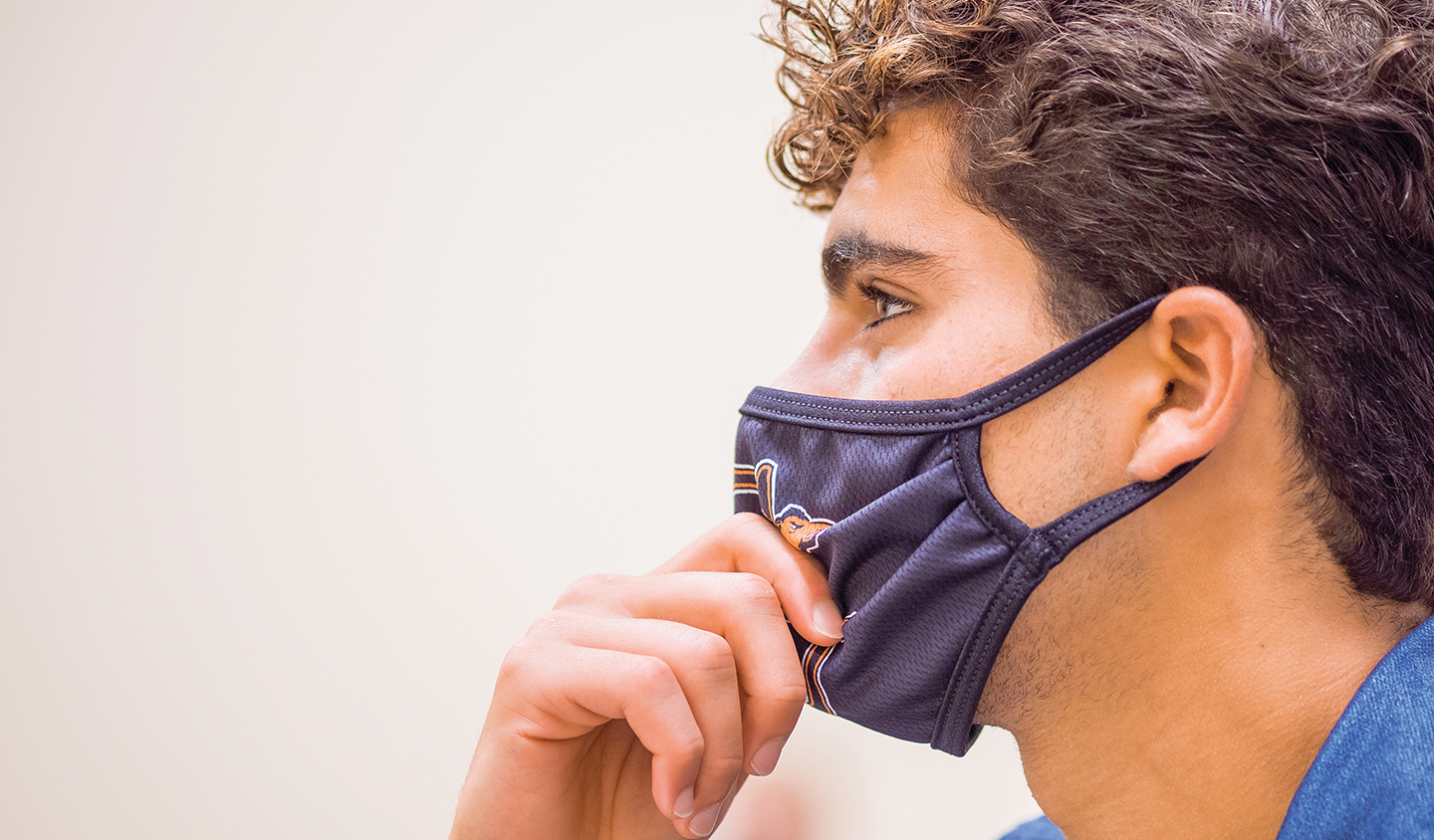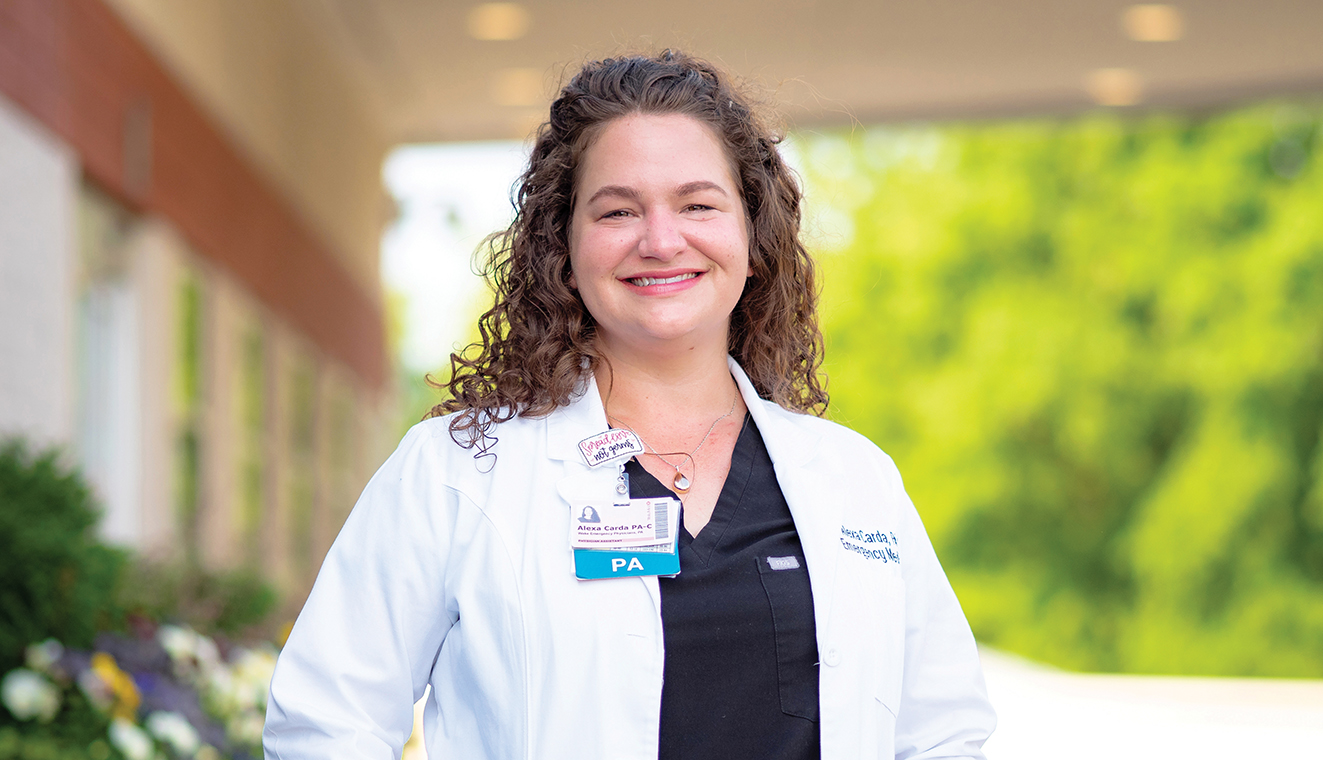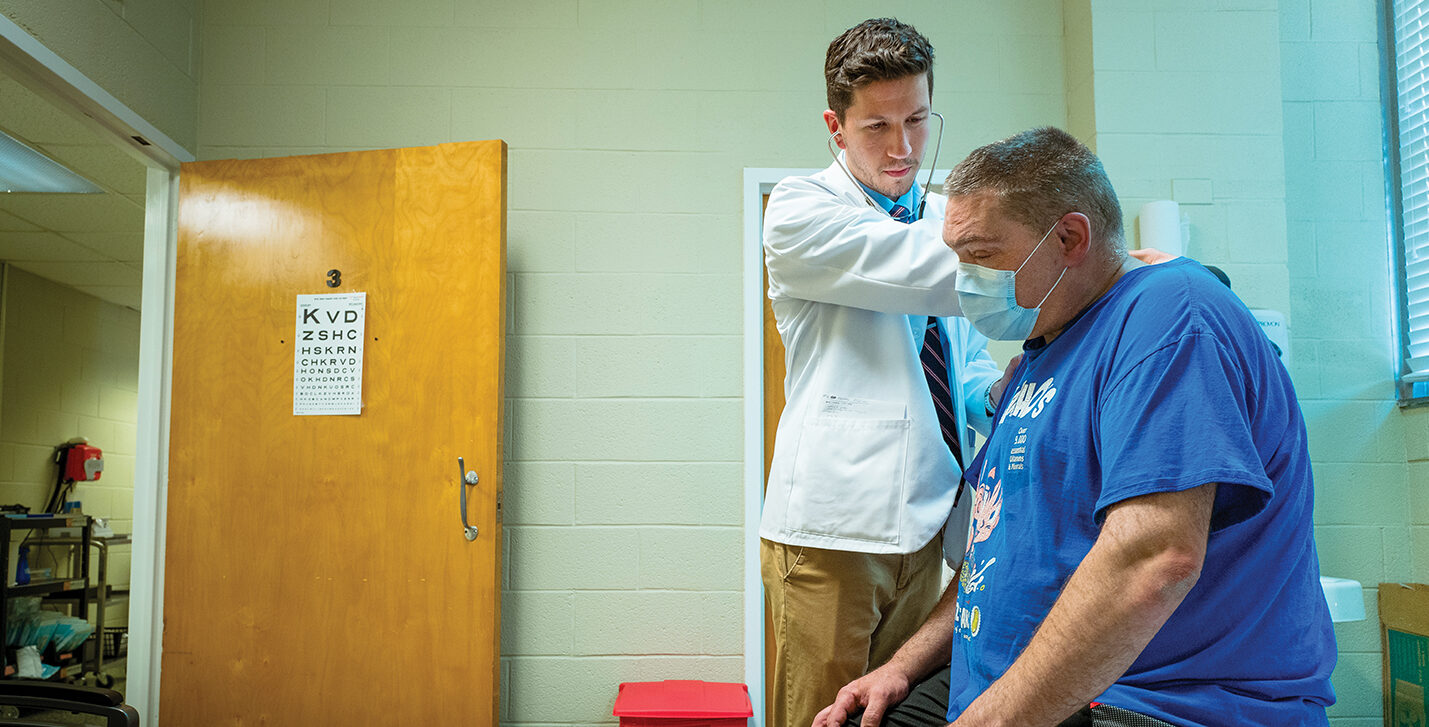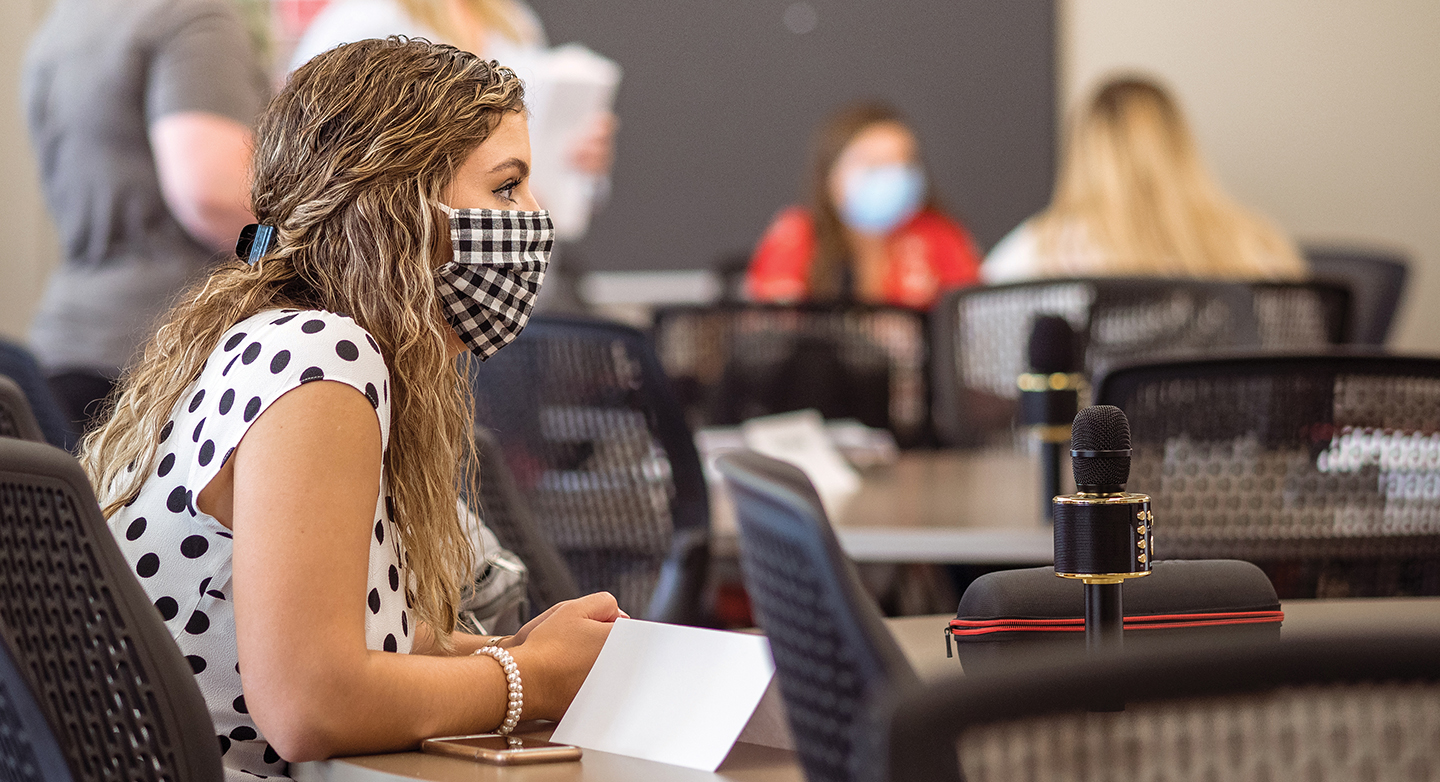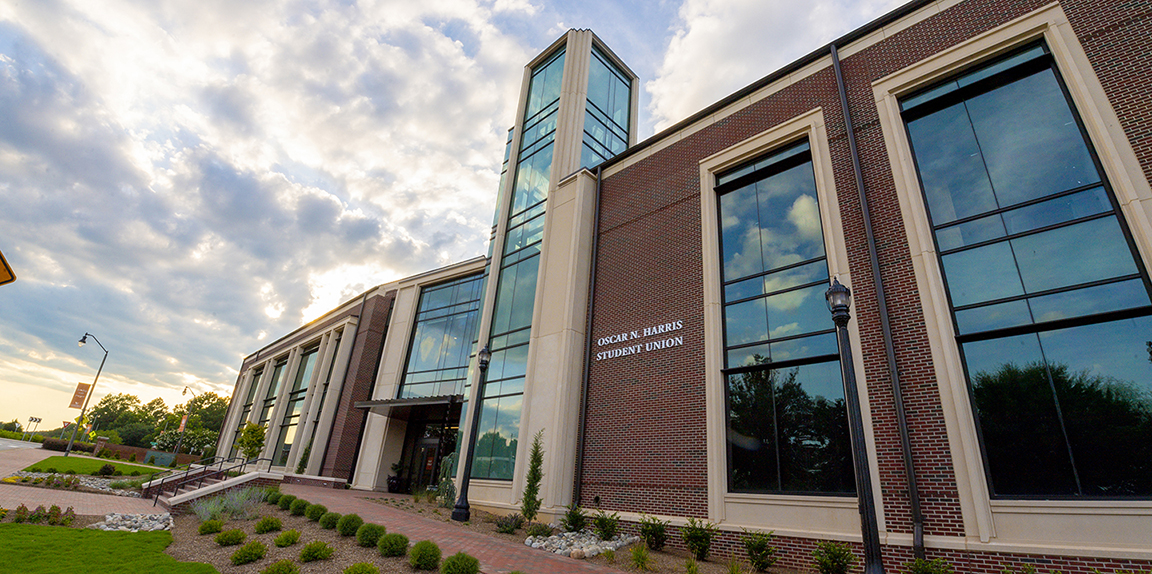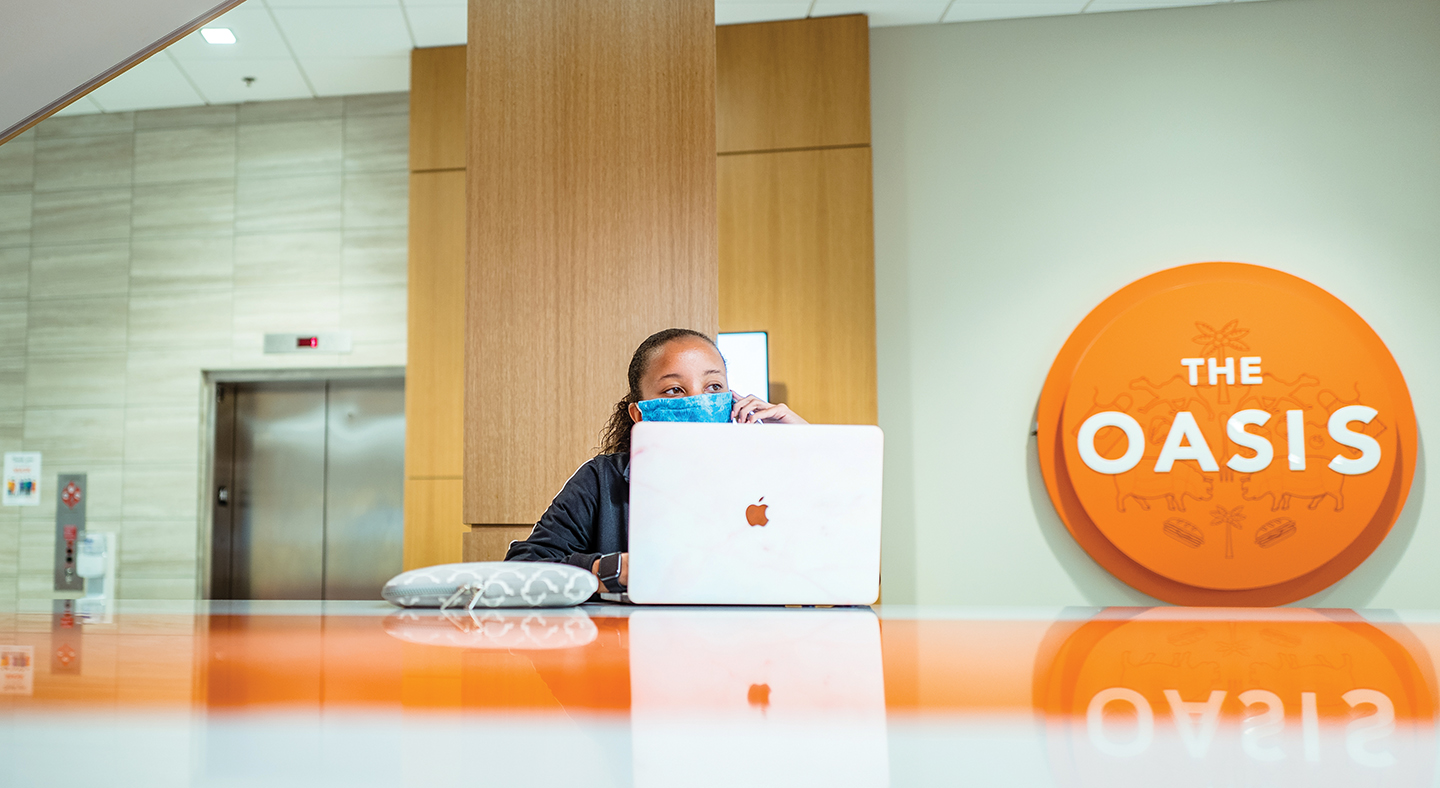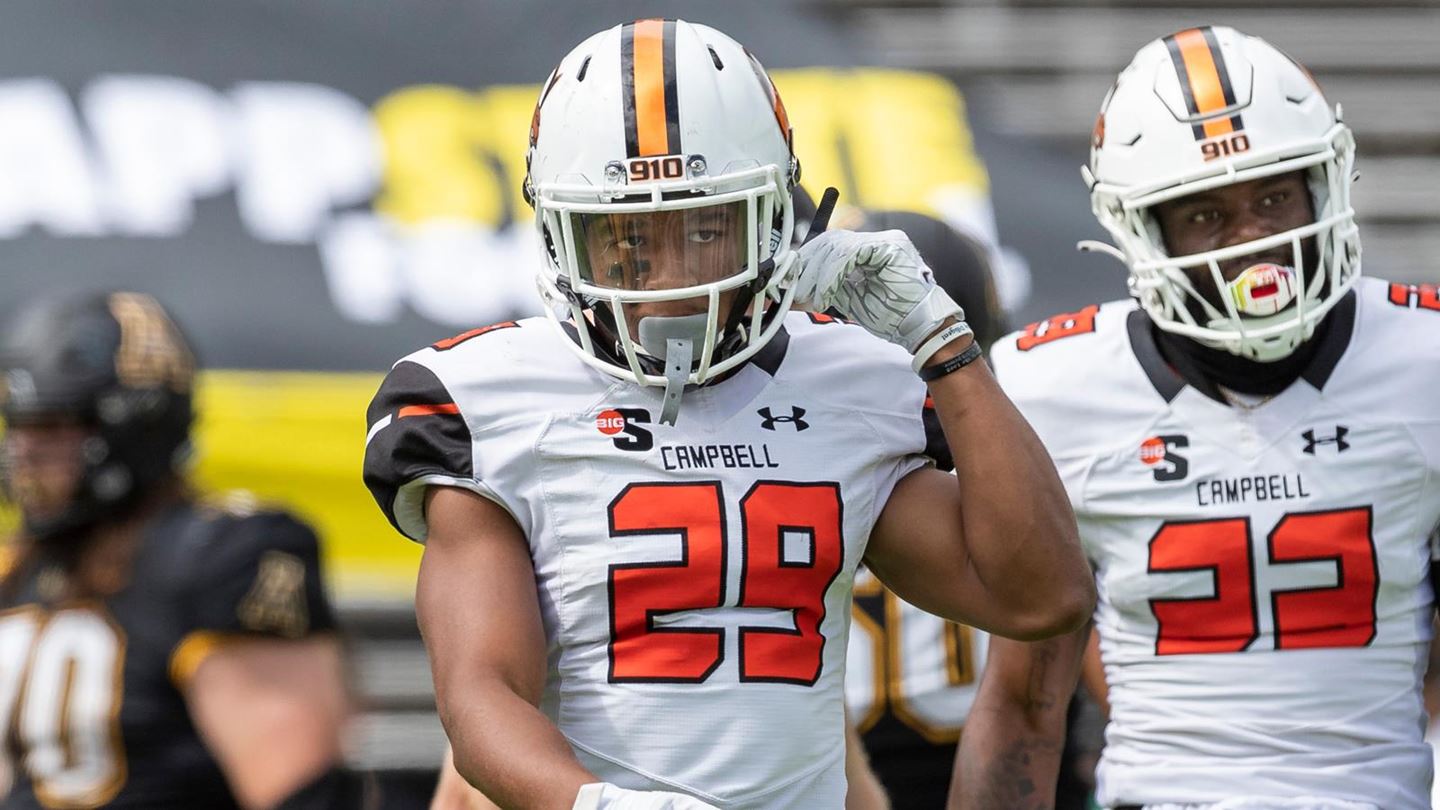While COVID-19 influenced just about every aspect of our year, 2020 still brought out the best in our community
We often use this day to celebrate the year that was at Campbell University, but on this last day of 2020, “celebrate” is hardly the word we’re looking for.
The COVID-19 pandemic has led to the infection of more than 83 million people globally and has been responsible for nearly 2 million deaths. It has shut down entire countries and wrecked once vital economies. It has changed our way of life on multiple levels, and in higher education, it has changed the way we teach and learn.
At Campbell University, the pandemic led to the first extended campus shutdown in 120 years when a fire destroyed then-Buies Creek Academy. It forced students and faculty to embrace remote learning for the spring and summer semesters, and even when face-to-face learning resumed in the fall, life was different at Campbell University. Large events like Homecoming were canceled. Students were asked to remain socially distant and wear masks when around others. The threat of another shutdown loomed over the entire semester as campuses across the nation faced tough decisions as cases continued to rise in the U.S.
Heading into 2021, we’re still living this “new normal,” though hope is on the horizon in the form of new FDA-approved vaccines expected to reach millions in this new year.
It should come as no surprise that for our “Top Stories of 2020” list, COVID-19 is the theme. The pandemic has touched just about every aspect of life at Campbell. Fortunately, it’s not all negative news. In fact, the pandemic has brought out the best in many in our Campbell community. Leaders have stepped up in their respective fields — public health, medicine, pharmacy, education and divinity, to name a few. Students and faculty have shown great resilience while navigating between online and in-person learning, and all have remained diligent to do their part to curb the spread of the virus on campus.
Those efforts allowed Campbell to finish its fall semester in November — taking only a two-week “pause” in October when cases began to rise.
2020 will certainly go down as a memorable year for Campbell, one whose impact will be felt for generations to come. The following is our pick of the top stories to emerge from the year. May your 2021 be packed with blessings and the hope that we can all come together again.
OUR WORLD PUT ON PAUSE
On March 12, the University Board of Trustees voted to transition all in-person classes on all Campbell campuses to online and remote learning.
The original plan called for just a two-week change with the hope that things would get “back to normal” by April. At the time, North Carolina had just 15 reported COVID-19 cases and no hospitalizations, and the governor had issued restrictions on gatherings of more than 100 people.
But by March 16, Campbell’s first day of remote learning, confirmed cases in the state had more than doubled. Among those new cases was the first reported Campbell student to test positive after a visit to the University’s health center.
By March 19 — with cases climbing and campuses across the nation beginning to shut down — President J. Bradley Creed made the difficult decision to make the transition to online learning permanent for the spring semester and shut down all residence halls and campus-run apartments until the campus was deemed “safe” for students to return. This also meant a halt to all spring sports (the Big South Conference had previously canceled all spring games a day earlier), all academic events and Study Abroad travel and a postponement of spring commencement in May.
Within a matter of days, Zoom meetings and WebEx classes became the new “normal” for Campbell students, faculty and staff. The annual Wiggins Memorial Library Academic Symposium became a virtual symposium, with more than 100 students taking part with online presentations. The scheduled opening of the University’s 110,000-square-foot student union was delayed (the “grand opening” became a 40-minute virtual event hosted by students and staff on May 6).
For many, that final semester of their senior year came to an abrupt end. Communication studies major Ka’Deem Wynn finished his degree 500 miles away at his family’s home in Palm Coast, Florida.
“You have this dream — college is supposed to be this big experience for you, and you expect it to end a certain way,” he said. “And when it doesn’t, you feel like you’re in limbo, if that makes sense. It’s not any one thing I’m missing out on — you just want those final few months to accept the end of it. Campbell was my home for four years, and it almost felt like I was being evicted early. I would have just liked to have finished on my own terms.”
For senior basketball standout Hayley Barber, COVID-19 meant a premature end to her athletics career and missing out on the team’s first NCAA Tournament trip in 20 years.
“Just a chance to play one more game, that’s all I really wanted,” she said. “Once [the seasone ended], it did not seem real for a really long time. It’s so weird because the weather outside was perfect and everything seemed kind of normal. But the world just stopped.”
In short, the COVID-19 pandemic changed life at Campbell University. Even heading into the spring of 2021, those changes are still in place.
Students now follow the Ws: wearing face masks, waiting six feet apart, and washing hands often. Classes are a mix of in-person and online to help de-densify campus. Hallways have been converted to one-way corridors and buildings have specified entrance and exit doors to reduce points of contact. Hand sanitizer stations have sprung up across campus, and a temperature reader helps students monitor their wellness. Staff have ramped up cleaning, Plexiglass barriers have been installed in food service areas and many spaces are reduced to 50 percent capacity.
These changes allowed students to return in August, but there’s still a long way to go before “normal” returns.
Links
LEADERS EMERGE FROM THE PANDEMIC
COVID-19 has forever changed Alexa Carda Gaters’ career and the professional futures of all Campbell University health science alumni and students.
A 2015 graduate of Campbell’s Master of Physician Assistant Practice program and a Wallace Student Society president, Gaters was originally called to medicine as a young teen when she lost her mother, Shirlee Carda, to cancer. She chose the physician assistant path because she liked the flexibility and lateral mobility of the profession. Today, she works for Wake Emergency Physicians, PA (WEPPA), an independent group of physicians and advanced practice providers that has an exclusive contract to staff all of WakeMed’s seven emergency rooms in the Triangle region.
“We’ve seen the full spectrum of illness in our emergency departments, from minor coughs to respiratory distress requiring intubation,” Gaters said back in May. “And although we are accustomed to immediately rushing to the bedside in the ED, we now take the time to don our [personal protective equipment], knowing that they can make a life-or-death difference for ourselves, our families and our colleagues.”
She says her education at Campbell prepared her for the current challenge. She can still hear the words of PA Chair and Director Betty Lynn Johnson reminding her to “stay flexible and always keep the patient first, treating them as you’d want your own grandmother to be treated.”
“This has especially helped me over the past couple of months, as we’ve had to stay flexible to keep up with the evolving guidelines and protocols each day, and to practice medicine in ways we aren’t familiar with,” Gaters says. “My patients need my compassionate care and reassuring touch more than ever, as visitor restrictions mean that most are completely alone in the emergency department and when admitted to the hospital. Taking an extra moment to listen to them, reassure them that they are in good hands and to call to update their worried families, can make a world of a difference in an already challenging time.”
When Campbell launched its PA program in 2011, it marked the beginning of a decade-long plan to purposefully expand its offerings in health sciences (its College of Pharmacy & Health Sciences had made a name for itself in the pharmacy world, and the University was poised to grow from that seed). Osteopathic medicine, nursing, physical therapy and other health science programs soon followed, born to not only serve underserved regions of North Carolina and the Southeast but to also answer the call for projected health care professional shortages throughout the country.
Few factored in “global pandemic” to that need, but that’s where we currently stand. Not only are these professionals in demand in most regions of the country, recent graduates have been called to step up in many areas where the risk is too high for older nurses and physicians to be in close contact with infected patients.
“[The pandemic] has changed the perspective of how I look at medicine and the career I’ve chosen,” says Bryan Gottwalt, a fourth-year medical school student whose hospital rotations were cut short in February when school officials made the move to protect its students from working in high-risk areas. “Medicine is something I’ve wanted to do for a while, because I wanted to help people. But now I’m seeing just how essential it is. It’s been sobering to hear what some of my friends who are resident doctors are going through — a lot of long hours and just increased expectations in every regard.”
Campbell University graduates, students and faculty and staff have emerged as leaders in not just medicine and health care, but in several areas since the start of the pandemic. From teachers who have adapted to online teaching to ministers who have been forced to care for their congregations at a distance. From entrepreneurs and business leaders who have found ways to help others during these challenging times to engineers who have been called on to develop safer and better personal protection equipment.
And from pharmacy graduates chosen to administer the first doses of the COVID-19 vaccine to frontline medical workers and those most at-risk … the pandemic has brought out the best in many of us.
Links
CAMPBELL FINISHES THE FALL SEMESTER
The plan all along was for Campbell University to attempt — and complete — the fall semester with a hybrid of in-person and online classes, with the Thanksgiving break acting as the “finish line” before students complete their finals remotely from home.
Not every college and university in the nation was able to follow through with these plans. Some were forced to alter their plans before the semester even began.
The measures put into place by Campbell administration and several task force committees — which included the forward-thinking decision to provide on-campus students with private accommodations in residence halls — earned the University high marks in a Johns Hopkins Bloomberg School of Public Health assessment, which graded the University “well-prepared” for a return to in-person learning.
The result — Campbell University halted classes only once in the fall — a two-week “pause” when positive case numbers among the student body began rising to concerning levels in late September. Classes resumed on Oct. 12, and at semester’s end, the University launched an initiative to test all on-campus students for COVID-19 before they departed for home. Operation Safe Return — which ran from Nov. 20 to Nov. 24 — offered free rapid virus testing for nearly 1,000 undergraduate students. Only 1.6 percent of the students tested came back with a positive test.
“The University took the initiative to provide this COVID test with the hope that our students would not be a carrier of this virus into their families and communities,” said Vice President for Student Life Dr. Dennis Bazemore. “We are committed to the health and safety of our students, faculty and staff, and we are also concerned for the health and safety of our students’ families.”
Links
STUDENTS, FACULTY JOIN FIGHT FOR RACIAL EQUALITY
2020 marked a crucial time in the history of civil rights in the United States. The death of George Floyd after being detained by Minnesota police officers in May; the death of Breonna Taylor, a Kentucky EMT shot to death in her home by an officer executing a no-knock warrant in March; and the death of Ahmaud Arbery, a Georgia man confronted and killed by three white men as he jogged through their neighborhood in February; created a new movement of Americans — of all races — protesting systemic racism and inequality when it comes to law enforcement and the nation’s criminal justice system.
In August, Campbell Magazine featured six students of color and different ethnic backgrounds in its cover story titled “And Justice For All.” Future lawyers Morgan Swink, Melvin Holland, Justin Lockett, Monica Gibbs, Alyssa McPike and Darius Boxley shared their experiences with racism and inequality and shared why they chose to enter a profession that hasn’t always been “just” for people like them (while Black people represent roughly 33 percent of the U.S. incarcerated population, they make up just 5 percent of the nation’s lawyers).
These young men and women are part of a small, yet growing group of Campbell Law students looking to close this gap. Most are members of the school’s Black Law Student Association, created to provide support and networking opportunities for students of color. Some made history just last year by becoming the first Campbell team to win the Constance Baker Motley National Trial Competition, hosted by the National Black Law Students Association — besting several historically Black universities in the process.
On June 2, President J. Bradley Creed recorded a statement for the Campbell community on equality and the University’s Christian mission.
“Christian truth and biblical teaching affirm that the Kingdom of God in this world is rooted and grounded in the Christian community,” Creed said. “In this community, all people, created in the image of God, are valued, treated with dignity, and cherished. This is a compelling vision to which we aspire and into which we grow.
“In our desire to be open and inclusive, we strive to be a diverse community of learners, pledged to a common purpose and common effort on common ground. Black lives do matter and racism has no home here. The diversity of our students, faculty, and staff, when we work together to fulfill our mission, can reflect the unity, truth, and beauty of the Kingdom of God.”
“We learn best when we listen, even when what we hear challenges our assumptions, confronts our attitudes or makes us uncomfortable. But listening that leads to self-reflection and self-examination can be a bridge to greater understanding, especially of those who have experienced discrimination and injustice and suffered because of it.”
In the fall, the University launched a Diversity in Community website to encourage others to “develop traits of moral courage, social sensitivity and ethical responsibility.”
Links
STUDENT UNION OPENS ITS DOORS
When the Oscar N. Harris Student Union finally earned its certificate of occupancy in April of this year, the occasion was bittersweet. The certificate marked the end of over two years of construction and was the result of millions of dollars in generous gifts given to the University through the ambitious Campbell Leads campaign.
But the long-needed and highly anticipated 110,000-square-foot facility opened its doors in May to an empty campus. In a twist of irony, the building born to serve as a social hub for Campbell’s student body was finished at a time when the only “social” activities happening are of the “distant” variety.
Instead of opening its doors to a large crowd of students, faculty and alumni, the student union was introduced to the Campbell community on May 6 through a virtual tour on Facebook Live that garnered more than 20,000 views online. The tour wasn’t quite the celebration imagined back when construction began in 2018. But it provided hope that one day soon, Campbell students will be together and life in Buies Creek will return to some level of normalcy.
“This student union is something that started as a dream, and today, that dream is a reality,” President J. Bradley Creed said to begin that virtual tour. “The campus has essentially been talking about doing this since the 1970s, and it’s here today because of the hopes, dreams, prayers, dedicated efforts, hard work and generous and selfless contributions from our friends, our donors and our alumni.”
Students began enjoying the facility in August, all while following social distancing and facemask guidelines. Not every portion of the new facility has seen its full potential — the fitness center, movie theater and ballroom have all operated at very limited capacities — but already the building has become a popular destination for students, and Campbell is seeing glimpses of the type of social hub it will one day become.
Links
FIRST CLASS OF ENGINEERS EARN THEIR DEGREES
Thirty-three students made history from their homes on May 9, as the first graduates of Campbell University’s School of Engineering.
The graduates, who earned Bachelor of Science in Engineering degrees (with concentrations in mechanical, electrical and chemical engineering), secured jobs this year in a variety of industries — bio pharmaceuticals and manufacturing, design firms and architectural firms, federal agencies and the private sector. Many have remained in the Research Triangle area close to home, while others have secured jobs as far away as Wisconsin and New Hampshire. Still others have already begun graduate school.
Founding Dean Jenna Carpenter described her feelings at the end of her school’s first four years as a mix of elation and sadness.
“It is the culmination of five years of hard work on our part and four years on theirs,” she said. “We have watched them grow from high school students into engineers. While all of our students are special, this class is special in a way that no other class can ever be. They have helped us build the school and program from scratch.”
Campbell announced it was adding engineering back in 2014 and brought in Carpenter, then an assistant dean at Louisiana Tech University, the following year. The school officially launched in the fall of 2016 with diversity in mind and a mission to offer a unique, hands-on, project-based approach to engineering.
In four years, the school has come a long way from a fledgling program to a program that’s gained national attention for its approach. In 2019 alone, the school competed in the NASA Human Exploration Rover Challenge for the first time, attended the Grand Challenges Scholars Program for the first time in Washington, D.C., became the nation’s 45th Kern Engineering Entrepreneurial school, and — perhaps most impressively — was named one of the nation’s most inclusive engineering schools by the American Society for Engineering Education. The program currently sits at more than 200 students, according to Carpenter, with plans for growth and additional concentrations on the horizon.
Graduate Morgan Hughes began her career as an engineering validation associate at Pfizer in Sanford in July. She credited her experience at Campbell and the hands-on instruction she received to prepare her for the next step.
“Being a part of the inaugural class meant that I got to help lay the foundation of what a Campbell engineer can be,” she said. “My education at Campbell gave me the ability to work in a team and leadership experience through projects and through academic clubs. I could not think of a better place to have gotten my education than Campbell.”
Links
CAMPBELL LEADS CAMPAIGN HITS GOAL, AIMS HIGHER
The Campbell Leads campaign — an ambitious five-year $75 million campaign created to benefit student scholarships, the Oscar N. Harris Student Union and the Fund for Campbell — hit its goal in the fall just four years after its launch.
The campaign crossed that milestone on the shoulders of record giving from Campbell University alumni, friends, parents and employees. The campaign received a major surge from the largest single gift in Campbell University’s 133-year history — a $13 million donation from former Campbell President and First Lady Norman and Mildred Wiggins to create the Wiggins Arts & Sciences Endowed Scholarship, which will benefit undergraduate students for years to come.
Campbell Leads was among the first initiatives set forth by President J. Bradley Creed when he took office on July 1, 2015. Launched exactly one year later, the campaign’s goal was to raise $75 million by the end of 2021. With that end date still in mind, Creed and the Office of Advancement at Campbell University have increased the goal to $100 million.
“I could not be more pleased that we met our campaign goals within four years, and can announce a stretch goal to $100 million through 2021. The generosity of Dr. Norman and Millie Wiggins and thousands of others in the Campbell family is remarkable. We’re deeply grateful.”
More than 48,000 contributions were made to the Campbell Leads campaign over the past four years. Twenty-six of those gifts surpassed $1 million, and nearly 500 exceeded $25,000.
Of the $75 million raised, $25 million built the Oscar N. Harris Student Union, which opened its doors in the spring and welcomed students for the first time in August. The 115,000-square-foot facility is home to a large-scale banquet hall, new campus dining options, offices and meeting areas for students and student-led groups, a 200-seat movie theater, a two-story fitness center and a new Campbell merchandise and gift shop.
Bob Barker (’65), chair of the Student Union Fundraising Campaign, said he and his wife Pat knew when they agreed to lead the funding efforts that it was a special project for Campbell students. The Barkers have been part of many major initiatives at Campbell, but perhaps none bigger than a new student union.
“More than 3,000 individuals stepped forward to help make this historic facility a reality for the campus community and our alumni,” Barker said. “Thanks to the naming gift from my classmate Oscar Harris (’65), the Oscar N. Harris Student Union will serve Campbell students for generations to come.”
Roughly $32 million of the money raised has been designated for endowed scholarships for Campbell students. Donors make it possible for Campbell to award approximately 900 scholarships each year.
Additionally, $20 million raised for the Campbell Leads campaign has been committed to establishing and funding several projects over the last four years, including the creation of the First Citizens Bank Wealth Management Center, BB&T Business Fellows Program, development of the law school’s Blanchard Community Clinic, renovations to the soccer stadium, construction of locker rooms and a new scoreboard at Jim Perry Stadium, a new scoreboard at Barker-Lane Stadium, expansion of the wrestling facilities at the John W. Pope, Jr. Convocation Center, renovations to the Cornelia Campbell Alumni House and more.
The campaign also established the Fund for Campbell, which provides the University with the leverage to embark on new learning opportunities while continuing to address immediate needs. The flexibility of this fund allows for the institution’s continued growth through investments in facility enhancements, innovative technology, life-changing financial aid, enrichments to the student experience and more.
Links
ATHLETICS PROGRAMS GET NATIONAL ATTENTION
The Campbell Fighting Camels’ 2020 football season ended up being one of the most successful and important seasons in the program’s short history.
And they went winless.
In a season where few FCS programs took the field in hopes of having a spring football season, Campbell Head Coach Mike Minter and Athletics Director Omar Banks chose to play a four-game season, the most allowed by the Big South Conference in the fall. And all of those games were against FBS programs.
The Camels started with a one-point, last-second loss to Georgia Southern in its opener, played Coastal Carolina tough, looked respectable against Appalachian State and finished out with its first game against a Power 5 opponent at Wake Forest in early October.
All four opponents ended their seasons with a winning record. Three of those opponents went on to bowl games, and Coastal Carolina finished its season as the 12th-ranked team in the nation. And along the way, Campbell appeared on ESPN, ESPNU (both firsts), ESPN+ and the ACC Network — introducing millions of viewers to the small private university with the unique mascot for the first time.
Without a doubt, it was a successful 0-4 campaign.
But football wasn’t the only program to enjoy national recognition in 2020.
The men’s soccer team — coming off its first College Cup playoff win in 2019 — entered 2020 as the 19th-ranked team in the nation. Though the program was put on hold for the fall (with intentions to play in the spring), the ranking was the highest in the Camels’ storied soccer history.
The women’s basketball team finished its 2020 regular season as the Big South champions and earned its first NCAA Tournament bit in 20 years in March before — unfortunately — all NCAA tournaments were canceled due to the COVID-19 pandemic. The team has started strong this fall and is eyeing a return to postseason play in 2021.
The wrestling program enjoyed its best season in program history in 2020, finishing the regular season at 11-2 overall and a perfect 7-0 in Southern Conference duals, winning its final nine matchups, including all seven conference bouts. Additionally, five Camels earned All-American status from the NWCA. Campbell, ranking as high as No. 12 in the country, completed a sweep of the SoCon during the regular season, claiming its second straight league dual championship.


